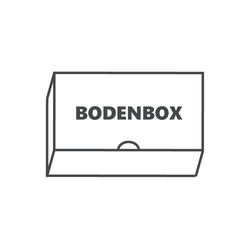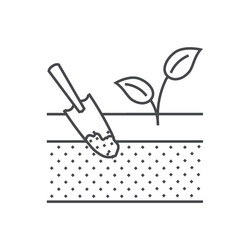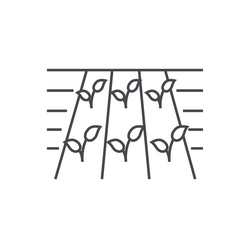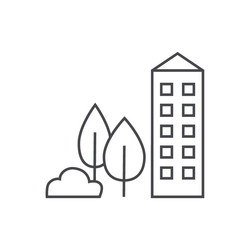Soil survey
Soil tests are not only useful for farmers and gardeners, but also in your own private garden. Plant nutrition is an extremely complicated process that is influenced on the one hand by the supply of nutrients in the soil, and on the other hand by conditions such as moisture, aeration, temperature or season.
A soil test indicates the condition at the time of sampling. The examination makes it possible to clearly identify the nutrient supply of the soil and to derive appropriate measures.
We offer solutions and packages for private home and hobby gardeners as well as for customers in the agricultural or horticultural sector.
Soil testing for private customers
Do you know the nutrient content of your soil? With little effort, you can have the availability of important elements such as nitrogen, phosphorus or potassium determined. Your soil sample will be analyzed by our experts. With the result of the soil analysis you determine the necessary amount of fertilizer for your plants.
There are two options available to you for tests in the private sector:
Sending in a soil sample with the AGES soil box (pre-assembled scope of examination) or an individual soil examination of your soil sample (examination parameters according to your wishes).
AGES soil box
With the AGES Soil Box, you can have the pH value, humus content and nutrient content (phosphorus, potassium and magnesium) of your soil tested.
You can either order the AGES Soil Box via the AGES website or buy the AGES Soil Box from a selected specialist retailer (see below). You will receive your test results as well as the fertilizer recommendation including access to our fertilizer calculator by e-mail.
You can purchase the AGES soil box from our various sales partners:
- Biohelp - Garden & Bees Kapleigasse 16 1110 Vienna
- Diwoky "Your garden friend" GmbH Leopoldauer Platz 49/corner Kürschnergasse 1 1210 Vienna
- IBL building material + laboratory GmbH Theillissengasse 3 2201 Gerasdorf
- primeinsects Wartkogel 14 9462 Bad St.Leonhard
- Wallner Rasenpflege Josef Musser-Straße 11/2 2514 Wienersdorf
If you are also interested in distributing the AGES soil box, please contact us at: bodenbox@ages.at.
Yes, you are welcome to order the AGES soil box directly from us at the unit price of € 60.12 plus shipping costs (shipping to you) of € 6.12 incl. VAT.
Please send an e-mail with the following information to bodenbox@ages.at:
- Name
- Address
- Phone number
- Desired number of soil boxes
As part of the test report, you will receive a representation of the necessary nutrients for the crop and area you have specified. To find the right fertilizer and dosage, you have several options:
- Click on the link to the fertilizer calculator in your nutrient recommendation or scan the QR code with your smartphone. You will be redirected to the AGES Soil Box fertilizer calculator, where you can select the type of fertilizer you need and the necessary amount of fertilizer will be calculated for you.
- Take the results to the store where you bought the box and get advice there.
The results of a soil test can be used to recalculate nutrient requirements for up to four years. After this period, re-sampling is recommended.
Not only the soil test and the resulting fertilization have an impact on plant growth. In addition to these factors, the weather and environmental conditions such as water conditions, location and climatic zones also play an important role. Correct irrigation is just as important as the supply of nutrients.
Viruses, bacteria or pests can also harm your plants - our plant health experts will be happy to help you identify them and advise you on how to combat them.
We keep your sample material for you for six months. You can order additional tests (such as testing for clay content or heavy metals) at any time. To do so, send us an e-mail at bodenbox@ages.at stating your order number and we will inform you about possibilities and prices.
You will need:
- a clean spade or garden shovel
- a clean bucket/container for mixing the individual samples
- the enclosed plastic bag
Sampling
- Poke the soil with the spade and push the soil apart. A thin layer of soil is tapped off one side of the hole and poured into a clean container (e.g., bucket). The sampled area should have uniform planting and soil conditions as uniform as possible. This is best seen by the uniform growth of the plants. If you intermix samples from lawns, vegetable beds, or ornamental plant borders, the sample result will not be meaningful.
- For flower and vegetable beds, remove soil to a depth of about 25 cm. For lawns, a depth of 10 cm is sufficient. Put the soil into the bucket. Repeat this in about ten places.
- Mix all the soil collected in this way thoroughly and then use it to fill the plastic bag completely.
- Put the plastic bag filled with soil and well closed into the AGES soil box, enclose the completed order sheet and close the AGES soil box.
- Drop the box in the nearest mailbox - we will pay the return postage.
The results of the AGES soil box
After about 14 days you will receive your results together with a fertilizer recommendation by e-mail. In the fertilization recommendation you will also find your access link to the AGES fertilizer calculator.
With the results of the soil test, you can always recalculate the fertilizer requirement for up to four years.
AGES fertilizer calculator determines optimum fertilizer quantity
As part of the test report, you will receive a representation of those nutrients that are required on the crop and area you have specified. To find the appropriate fertilizer and the correct dosage, please proceed as follows:
Click on the link to the fertilizer calculator in your nutrient recommendation or scan the QR code with your smartphone. This will redirect you to the AGES Soil Box fertilizer calculator. There you can select the plant type and your desired fertilizer type (manure/compost or commercial fertilizer). The AGES fertilizer calculator then determines the optimal amount of fertilizer and sends you the result as a "shopping list" via SMS. If you want to grow other plants the following year, you can use the fertilizer calculator again to determine whether sufficient nutrients are available or whether you may need a different fertilizer. Detailed instructions on how to use the AGES fertilizer calculator can be found here.
Individual soil testing - the flexible alternative to the AGES soil box
You compile your scope of investigation yourself - we are happy to support you! Our selection aid for soil analysis guides you through the creation of the order form. Then attach the printed and signed sample section for shipment.

Note on sampling
- Poke the soil with the spade and push the soil apart. The sampled area should have uniform planting and soil conditions as uniform as possible. This is best seen by the uniform growth of the plants. If you intermix samples from lawns, vegetable beds, or ornamental plant borders, the sample result will not be meaningful.
- For flower and vegetable beds, remove soil to a depth of about 25 cm. For lawns, a depth of 10 cm is sufficient. Put the soil into the bucket. Repeat this in about ten places.
- Mix all the soil collected in this way thoroughly and then use it to fill a plastic bag with about half a liter of soil material. The sample is then handed in at the laboratory or sent to the laboratory with the sample accompanying slip.
Soil testing for commercial customers
A soil analysis provides the basis for planning soil management measures, in particular for the targeted selection of suitable fertilizers and their efficient use. In addition to the analysis result, we provide a nutrient recommendation tailored to the site. The basis for this are the guidelines for proper fertilization of the advisory board for soil fertility and soil protection in the BMLUK. We are always available to answer specific questions.
For agriculturally used soils, the main focus is on nutrient supply. We recommend carrying out a basic investigation (pH, plant-available proportions of phosphorus and potassium) and determining the plant-available proportion of magnesium and the humus content.
The results of these soil tests provide important information about the nutrients available to plants in the soil. An additional determination of the soil type (content of sand, silt and clay) allows an even more precise assessment of the nutrient supply.
To estimate the nitrogen mineralization, the content of nitrogen that can be supplied later (Nnl) can be analyzed. Analysis of mineral nitrogen (Nmin) can also be performed to accurately calculate nitrogen fertilization. In addition, a variety of other analyses are possible, depending on the issue at hand.
For existing vineyards, the basic investigation (pH value, plant-available proportions of phosphorus and potassium) as well as the investigation of plant-available magnesium from both the topsoil and the subsoil are recommended, since a large proportion of the vine roots are also located in deeper soil layers.
In addition, in order to make a detailed recommendation, it is important to also consider the examination of lime content and lime activity (in case of suspected problems with lime tolerance of rootstock vines or signs of lime chlorosis), the content of plant-available trace elements (iron, manganese, copper, zinc, boron) and exchangeable cations.
As a basis for determining proper stock fertilization in new vineyard establishment, it is necessary to examine both topsoil and subsoil for pH, plant-available levels of phosphorus and potassium, and plant-available magnesium content. To enable the selection of suitable rootstocks, the lime content and lime activity should also be investigated.
For vegetable crops, it is useful to carry out the basic analysis (pH, plant-available phosphorus and potassium) and to determine the content of plant-available magnesium and the humus content.
Particularly in the case of problems, the determination of the content of trace elements as well as the plant-available boron can also provide essential clues. These investigations can also be supplemented by determining the electrical conductivity (corresponds to the content of salts in the soil).
To estimate nitrogen mineralization, the content of nitrogen that can be supplied later can be analyzed. For the exact calculation of nitrogen fertilization, the analysis of mineral nitrogen (Nmin) is recommended as a basis.
In cooperation with representatives of Bio - Austria and the Chambers of Agriculture, we have developed a testing package for soil that is specially tailored to the requirements of organic farming.
In an initial investigation, essential parameters for soil characterization and nutrient stocks are determined, while the follow-up investigation is used for nutrient balancing.
Based on the test results, recommendations for soil management and fertilizer planning can be made.
Sample site management and commissioning of analyses in the AGES soil sample portal
To order an analysis of agricultural soils, please send us an order letter together with the soil sample.
As a commercial customer, you have the option of using the free AGES soil sample portal to manage your field samples and to order soil analyses. Labels can also be created for the sample bags. The fast data exchange reduces the time it takes to finalise the order.
Click here to create the order. Once the analysis has been completed, the recommendation for the pure nutrient supplement requirement is saved and can be viewed and printed out at any time.
As an alternative to electronic recording, you can also complete the corresponding pdf order form online, print it out and enclose it with your test samples. The forms and further information on soil sampling can be found at the bottom of this page under Downloads.

Advantages of using the AGES soil sample portal
- Thecosts for sample preparation per sample are reduced to € 6.35 incl. VAT (with a discount from the Chamber of Agriculture).
For comparison: With a discount from the Chamber of Agriculture, but without using the AGES soil sample portal, the costs are € 8.90 incl. VAT. Without a discount from the Chamber of Agriculture and without using the AGES soil sample portal, the costs are €11.15 incl. VAT. - Sample processing is accelerated so that farmers receive the results more quickly.
- The reports are stored centrally in the AGES soil sample portal.
- The Chamber of Agriculture discount can be specified via the "Project" input field - e.g. Chamber of Agriculture cooperation or LK discount(see screenshot).
Soil testing for commercial garden design
In garden design, the soil is of central importance: whether lawns, shrubs, flowers or even vegetables thrive is determined by its properties.
An examination of the soil provides you with convenient and uncomplicated information as to whether your soil is suitable for the use you are planning and what measures should be taken to improve the soil. In addition to basic examinations of the most important soil properties, our modular examination packages also provide information on the supply of trace elements and possible contamination by harmful elements. In this way, you can ensure that there will be neither disappointments nor complaints. For an overall project, an analysis can even represent a possible cost saving, since no subsequent work or repairs are necessary.
In order to guarantee reliable results, the examination of the nutrient content in the soil is carried out in accordance with the ÖNORMs applicable in Austria, evaluations and recommendations in accordance with the guidelines for proper fertilization of the Expert Advisory Council for Soil Fertility and Soil Protection of the Federal Ministry of Agriculture, Forestry, Regions and Water Management.
Our basic package includes testing of the soil according to the requirements for the production of vegetation and turf base layers. The following parameters are examined according to ÖNORM L 1210:
- pH-value
- plant available nutrients phosphorus, potassium and magnesium
- organic matter content (humus)
- C/N ratio
- exchangeable cations
- electrical conductivity
- lime content
- grain size distribution (sieve curve)
- Measures and fertilization recommendation
Extension I includes the testing of possible heavy metal contamination (e.g. in the case of backfilled soils of unknown origin or intended use as a vegetable garden) and the evaluation of the contents in relation to the planned use in accordance with ÖNORM L 1075. The following parameters are investigated in accordance with ÖNORM EN 16174:
Heavy metal contents (arsenic, lead, cadmium, cobalt, chromium, copper, molybdenum, nickel, mercury, vanadium and zinc).
Extension II allows a conclusion to be drawn about the supply of trace elements. This is recommended in case of intended use as vegetable garden, orchard or planting of herbaceous borders/hedges.
The following parameters are investigated according to ÖNORM L 1089 and L 1090:
"available" contents of the elements iron, manganese, copper, zinc and boron.
All investigation packages include a data interpretation including the picture of the grain size range (grading curve) and recommendations for further measures such as fertilization.
Notes on grain size determination
The determination of the particle size distribution (clay, fine, medium and coarse silt, fine, medium and coarse sand) is carried out in accordance with ÖNORM L 1061-2 without humus destruction.
At low humus contents up to 5 %, no relevant effect on the result is to be expected. In case of higher humus contents up to 10 %, the sample is forwarded to the soil physics laboratory of BAW-IKT in Petzenkirchen, depending on the expected influence of the organic matter on the result. If the humus content is above 10 %, all samples are forwarded for determination with humus destruction.

Note on grain size determination
Note on grain size determination
The determination of the particle size distribution (clay, fine, medium and coarse silt, fine, medium and coarse sand) is carried out according to ÖNORM L 1061-2 without humus destruction.
At low humus contents up to 5 %, no relevant effect on the result is to be expected. In case of higher humus contents up to 10 %, the sample is forwarded to the soil physics laboratory of BAW-IKT in Petzenkirchen, depending on the expected influence of the organic matter on the result. If the humus content is above 10 %, all samples are forwarded for determination with humus destruction.

Note The soil physical parameters "hydraulic water permeability" or "usable field capacity", which are referred to in ÖNORM L 1210, depend essentially on the grain size distribution (sieve curve) and the humus content. If these parameters meet the requirements, no problems are to be expected if the soil is properly installed without compaction.
If, in addition, you wish to have the physical parameters investigated by means of approximation methods (standardized compaction method in laboratory tests for suitability testing or on-site measurements for checking proper installation), please contact, for example, the Federal Office of Water Management, Institute for Cultural Engineering and Soil Water Management (BAW-IKT) in Petzenkirchen (ikt@baw.at). A sample quantity of approx. 10 liters of soil is necessary for this purpose.
Substrate investigation
The testing of horticultural substrates is used both to check the quality of the substrate before the start of cultivation and to analyze problems during cultivation.
The examinations are carried out in our accredited laboratory according to valid standards.
The following tests can be performed:
- Determination of bulk density (wet and dry)
- Determination of pH value
- Determination of salt content
- Determination of lime content
- content of mineral nitrogen (NO3 + NH4)
- plant available proportions of the elements P, K, Mg, Fe, Mn, Zn, Cu, B according to ÖNORM S 2021
- plant available proportions of the elements P, K, Mg, Fe, Mn, Zn, Cu, B in the CAT extract
- Plant compatibility test
The test can be followed by an appropriate interpretation of the results. Instructions for interpreting the substrate test can be found at the bottom of this page under Downloads.
The examinations are carried out according to valid ÖNORMEN, European and international standards. The scope of accreditation is listed on the homepage of the BMAW.
| Parameter | Standard reference | Description |
|---|---|---|
| Moisture density | ÖNORM S 2021 | Determination of wet density with self-compaction |
| Laboratory bulk density | ÖNORM EN 13040 | Determination of laboratory bulk density with external compaction |
| pH value (CaCl2) | ÖNORM S 2021 | Determination of acidity in CaCl2 suspension |
| pH value (water) | ÖNORM EN 13037 | Determination of acidity in water |
| Salt content | ÖNORM S 2021 | Determination of acidity in water (extraction ratio 1 + 10 M/V) |
| Electrical conductivity | ÖNORM EN 13038 | Determination of electrical conductivity in water (extraction ratio 1 + 5 V/V) |
| Content of plant available N | ÖNORM S 2021 | Determination of nitrogen in CaCl2 extract |
| Content of plant available P and K | ÖNORM S 2022 | Determination of P and K in CAL - extract |
| Content of plant available N, P and K in water extract | ÖNORM EN 13652 | Determination of N, P and K in water extract (extraction ratio 1 + 5 V/V) |
| Content of plant available N P and K in CAT extract | ÖNORM EN 13651 | Determination of N, P and K in CAT extract (extraction ratio 1 + 5 V/V) |
| Total nitrogen | STANDARD EN 13654-2 | Determination of total nitrogen by elemental analysis |
| Ash content | ÖNORM EN 13039 | Determination of ash content and organic matter content by ashing |
| Content of elements soluble in aqua regia | ÖNORM EN 13650 | Determination of elements in aqua regia extract |
| Plant compatibility test | STANDARD S 202, STANDARD EN 16086-1, STANDARD EN 16086-2 | Estimation of possible plant toxic effects |
Sample collection
Samples can generally be sent by mail or parcel services, but can also be delivered in person during the following hours:
Monday to Thursday from 07.30 to 16.00 Friday from 07.30 to 14.00
If you require personal advice or further information, our specialist staff are available every day from 07.30 to 15.30 hrs.
Contact
Leitung
Dr. Andreas Baumgarten
- bodengesundheit@ages.at
- +43 5 0555-34125
-
Spargelfeldstraße 191
1220 Wien
Last updated: 02.04.2025
automatically translated




